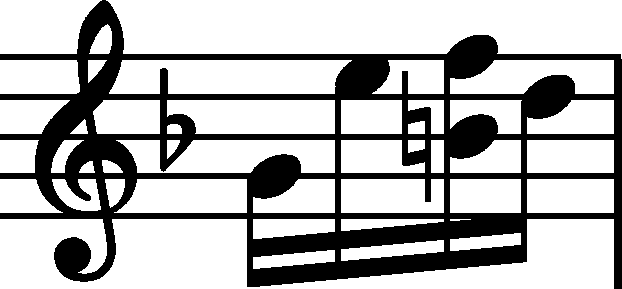



|
b. 2-8
|
composition: Op. 28 No. 24, Prelude in D minor
..
In A (→FC) the L.H. part is marked in these bars (as well as in b. 9) in an abridged manner as repetition of b. 1. category imprint: Source & stylistic information issues: Abbreviated notation of A |
|||||
|
b. 2-3
|
composition: Op. 28 No. 23, Prelude in F major
..
The fingering of EE cannot come from Chopin; however, it is natural, and it cannot be ruled out that it is consistent with the fingering the composer wanted to provide those figures with. category imprint: Differences between sources issues: EE revisions |
|||||
|
b. 2
|
composition: Op. 28 No. 23, Prelude in F major
..
The fingering of EE was added as a result of a revision of the publisher. category imprint: Differences between sources issues: EE revisions |
|||||
|
b. 2-10
|
composition: Op. 28 No. 23, Prelude in F major
..
The slurs in b. 2 and 6 (as well as in b. 18) explicitly encompass already the grace notes introducing the trills. In this situation, we consider the slur in b. 10 to be inaccurate; in the main text we suggest a slur analogous to the remaining ones. The notation of FC is vague – three out of four slurs run rather from the 2nd grace note (only in b. 6 from the first one). As such a notation is musically unjustified, we assume that the copyist meant slurs starting from the 1st grace note in all places, which is how it was interpreted in GE. As far as the end point of the slurs is concerned, according to us, the notation of A in b. 6 and 10 points rather to boldly written slurs (which were obvious to Chopin) than tenuto-slurs led to the end of the bar (see, however, b. 18). category imprint: Graphic ambiguousness; Differences between sources issues: Inaccuracies in FE , Inaccurate slurs in A , Inaccuracies in FC , Tenuto slurs |
|||||
|
b. 2-6
|
composition: Op. 28 No. 23, Prelude in F major
..
Thanks to the crossings-out and added notes in b. 2 and 6 visible in A, we can reconstruct the initial version of the last beat of these bars as category imprint: Corrections & alterations; Source & stylistic information issues: Corrections in A , Deletions in A , Main-line changes |

 and
and  . The idea of changing it probably arose when Chopin was writing b. 6; afterwards, he introduced a respective correction in b. 2. It is proven by the notation of an analogous figure in b. 10, in which the final version was written right away, without corrections.
. The idea of changing it probably arose when Chopin was writing b. 6; afterwards, he introduced a respective correction in b. 2. It is proven by the notation of an analogous figure in b. 10, in which the final version was written right away, without corrections.